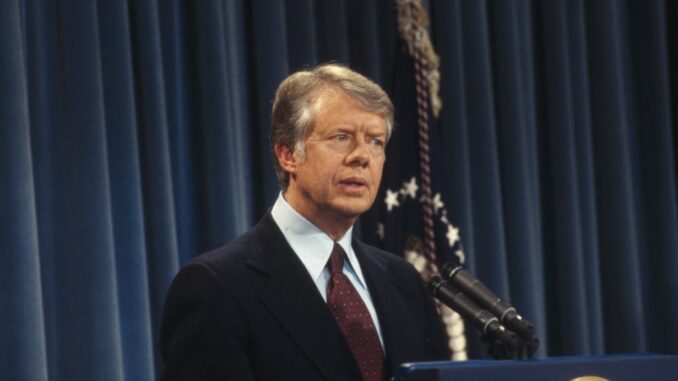
In the best light, James Earl “Jimmy” Carter Jr. should be the ideal American success story. But is he?
Born in rural Georgia in 1924, he joined the U.S. Navy following World War II and rose through the political ranks. He was elected as the 76th governor of Georgia in 1970 and the 39th president of the United States in 1976, serving one term.
It’s a story everyone should hold up as proof that anything is possible in the United States.
“Those of us who have been fortunate to have served as President understand this is a very exclusive club, and only we can relate to the enormous responsibility of leading the Greatest Nation in History,” President-elect Donald Trump said in a post to Truth Social.
“The challenges Jimmy faced as President came at a pivotal time for our country and he did everything in his power to improve the lives of all Americans. For that, we all owe him a debt of gratitude,” the 45th and soon-to-be 47th president added.
Remembering and honoring Carter was a bipartisan affair, even if “Jimmy Carter” has long been one of the most derogatory labels Republicans can bestow on a political opponent.
“Throughout his life and career, he remained grounded, never losing sight of his roots or the communities he served,” Georgia Rep. Karen Bennett, a Democrat, said in a constituent newsletter.
“His fight for world peace, advancing democracy, human rights, and social development, won him the Nobel Peace Prize in 2002,” Bennett added. “President Carter left a legacy of service as a change agent and was magnificently devoted to principles and purpose. He is gone but not forgotten.”
What is the Carter legacy?
Liberals might point to the U.S. Department of Education, created with a bill Carter signed in 1979, as a defense of his legacy. Conservatives might point to some of his deregulation initiatives, such as the Staggers Rail Act of 1980, as laudable.
Most presidential rankings place Carter in the mid-20s range. Observers like to laud Carter’s postpresidency efforts, such as his volunteer efforts with Habitat for Humanity. However, those efforts are counterbalanced by other misguided efforts and political failures, such as engaging with Hamas or the Iran hostage crisis.
No one will hold up the high inflation and gas prices that marred the Carter presidency as laudable or worthy of praise.
Most readers of mainstream media — most media, for that matter — in the wake of Carter’s Dec. 29 death at the age of 100 would forgiven for thinking the former commander-in-chief was universally approved for sainthood.
There is a fine line between speaking ill of the dead and honest assessment of a president’s accomplishments and legacy. As is so often the case, the media has largely absolved itself of critical scrutiny of Carter’s term as president, instead glorifying him as an infallible figure.
Even a God-fearing Baptist like Carter would have recognized no human is infallible.
Presidential history and travel go hand in hand.
Presidential history is engrained in travel and exploration, whether visiting a presidential library, Mount Rushmore or another presidential location, such as a presidential home or Dealey Plaza.
“I try not to speak ill of the dead so I’ll keep this brief: I have nothing nice to say about Jimmy Carter and I am not alone,” conservative radio host and pundit Erick Erickson said in a Jan. 6 Substack post.
“In fact, if you look at group pictures of former presidents, the Bushs, Clintons, and Obamas are usually glad-handing together with their spouses while Jimmy Carter is ostracised off to the side,” Erickson added. “He was a bad President and a worse former president who never met an American enemy he didn’t want to normalize.”



